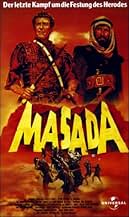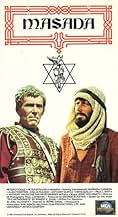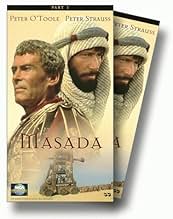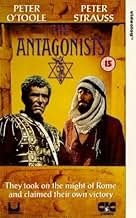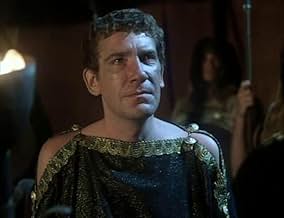Masada
- Miniserie de TV
- 1981
- 1h 39min
PUNTUACIÓN EN IMDb
7,8/10
2,5 mil
TU PUNTUACIÓN
Tras la destrucción del Segundo Templo, novecientos zelotes judíos resisten a una legión romana de cinco mil hombres en la fortaleza de Masada.Tras la destrucción del Segundo Templo, novecientos zelotes judíos resisten a una legión romana de cinco mil hombres en la fortaleza de Masada.Tras la destrucción del Segundo Templo, novecientos zelotes judíos resisten a una legión romana de cinco mil hombres en la fortaleza de Masada.
- Ganó 2 premios Primetime Emmy
- 3 premios y 15 nominaciones en total
Explorar episodios
Argumento
¿Sabías que...?
- CuriosidadesIn his opening monologue on April 7, 1981, Johnny Carson described this mini-series as a "Kosher Shogun". After watching the mini-series, Carson joked that he learned all Romans spoke with an English accent.
- PifiasDuring the scene in which the Jews are ascending the trail up to the summit of Masada, a vehicle the size of a bus can clearly be seen travelling on a road in the background
- Citas
Cornelius Flavius Silva: A victory? What have we won? We've won a rock in the middle of a wasteland, on the shores of a poisoned sea.
- Versiones alternativasAn extremely edited, two-hour version was released on video c. 1982.
- ConexionesFeatured in The 33rd Annual Primetime Emmy Awards (1981)
Reseña destacada
The movie is based on the book THE ANTAGONISTS and shows the story of the Jewish defense from the Roman oppressor. The story seems to be quite short and not the main focus of the film. Jews led by Eleazar stay in a huge fortress of Masada on the Judean Desert which is their only safe place away from the Roman Empire. Romans are forced to conquer them.
The movie shows human soul, psychological aspect of humanity, even of the "triumphant Roman leaders". This psychological aspect is revealed in both main characters: the Jewish leader Eleazar, portrayed wonderfully by Peter Strauss (one of his really best roles), and Flavius Silva (great Peter O'Toole), the leader of the 10th legion attempting at finishing the conquest and returning to Rome. Both of them are full of doubts. They change over the movie, develop like all of us do.
Silva doubts the logic of the whole campaign, which is especially emphasized at the end when he says desperately "What victory!? We have won a rock on the shore of the poisoned sea!" A rock that has cost thousands of innocent lives. He is also an honorable man. When Pomponius Falco takes over the leadership and occurs to be brutal, Silva tries his best to prove that this way of dealing with the enemy is "not Rome!" He even meets with Eleazar to justify these deeds.
Eleazar is a good Jew. He cares for his people but there is one thing which makes others confused. He doubts in the existence of God. However, deeply in his heart, there is a place for Him. Peter Strauss stresses this memorably when he goes to pray in order the Romans to stop killing the innocent Jews. In fact, he proves to love his people and that is, most appealingly, a better knowledge of God than any other...
The character that needs mentioning is Sheva (Barbara Carrera). She, in fact, is not very sure if she loves Silva or not. On the one hand, she wants to stay with him. On the other hand, her people seem to be more important. Finally, she decides to leave him. Her love is divided and demands a difficult choice. VERY PSYCHOLOGICAL!
In this comment I concentrated mostly on the psychological aspect. Yes, I admit that it appears to be the most significant factor for me. There are, of course, other factors that make me love this movie: the whole story, the locations, the music, the stars... EVERYTHING! But you will have a chance to appreciate all these aspects when you decide to see MASADA.
Finally, the end is unforgettable: "Take them their victory! Then they will remember..." Truly impressive script! One of the best lessons of life! 10/10 for the whole movie!
The final reference to modern Israel appears to be particularly touching!
YES, WE REMEMBER MASADA AND THE GROUP OF BRAVE PEOPLE WHO WERE NOT AFRAID TO REMAIN THEMSELVES AND RETAIN THEIR DIGNITY.
The movie shows human soul, psychological aspect of humanity, even of the "triumphant Roman leaders". This psychological aspect is revealed in both main characters: the Jewish leader Eleazar, portrayed wonderfully by Peter Strauss (one of his really best roles), and Flavius Silva (great Peter O'Toole), the leader of the 10th legion attempting at finishing the conquest and returning to Rome. Both of them are full of doubts. They change over the movie, develop like all of us do.
Silva doubts the logic of the whole campaign, which is especially emphasized at the end when he says desperately "What victory!? We have won a rock on the shore of the poisoned sea!" A rock that has cost thousands of innocent lives. He is also an honorable man. When Pomponius Falco takes over the leadership and occurs to be brutal, Silva tries his best to prove that this way of dealing with the enemy is "not Rome!" He even meets with Eleazar to justify these deeds.
Eleazar is a good Jew. He cares for his people but there is one thing which makes others confused. He doubts in the existence of God. However, deeply in his heart, there is a place for Him. Peter Strauss stresses this memorably when he goes to pray in order the Romans to stop killing the innocent Jews. In fact, he proves to love his people and that is, most appealingly, a better knowledge of God than any other...
The character that needs mentioning is Sheva (Barbara Carrera). She, in fact, is not very sure if she loves Silva or not. On the one hand, she wants to stay with him. On the other hand, her people seem to be more important. Finally, she decides to leave him. Her love is divided and demands a difficult choice. VERY PSYCHOLOGICAL!
In this comment I concentrated mostly on the psychological aspect. Yes, I admit that it appears to be the most significant factor for me. There are, of course, other factors that make me love this movie: the whole story, the locations, the music, the stars... EVERYTHING! But you will have a chance to appreciate all these aspects when you decide to see MASADA.
Finally, the end is unforgettable: "Take them their victory! Then they will remember..." Truly impressive script! One of the best lessons of life! 10/10 for the whole movie!
The final reference to modern Israel appears to be particularly touching!
YES, WE REMEMBER MASADA AND THE GROUP OF BRAVE PEOPLE WHO WERE NOT AFRAID TO REMAIN THEMSELVES AND RETAIN THEIR DIGNITY.
- marcin_kukuczka
- 23 oct 2004
- Enlace permanente
Selecciones populares
Inicia sesión para calificar y añadir a tu lista para recibir recomendaciones personalizadas
- How many seasons does Masada have?Con tecnología de Alexa
Detalles
- Fecha de lanzamiento
- País de origen
- Idioma
- Títulos en diferentes países
- Los antagonistas
- Localizaciones del rodaje
- Empresas productoras
- Ver más compañías en los créditos en IMDbPro
Contribuir a esta página
Sugerir un cambio o añadir el contenido que falta

Principal laguna de datos
By what name was Masada (1981) officially released in India in English?
Responde

